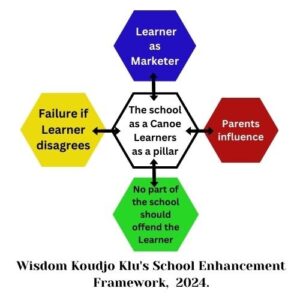The “School Enhancement Framework,” developed by Wisdom Koudjo Klu, an educator, stipulates that “The school is a canoe in the hands of the learner” to highlight the crucial role of learners in the success of educational institutions.
This framework stresses the importance of learner engagement, satisfaction, and connection with the school, which directly influences its reputation and development. It advocates for a learner-cantered approach, ensuring that the actions and decisions made by school leaders correspond with the needs and experiences of students for sustainable success.
The Framework
In the School Enhancement Framework, the learner is portrayed as the driving force behind the school’s development, similar to a paddler controlling a canoe. If learners lack active engagement and motivation, the school could drift aimlessly, akin to an unsteered canoe. The framework emphasizes that the learner is central to the school’s success, highlighting that their experiences and perceptions can significantly impact the institution’s reputation, growth, and sustainability. Thus, learners must be regarded as essential stakeholders whose views and satisfaction are crucial for the school’s future.
Key Components:
- Learners as Marketers
The School Enhancement Framework highlights the role of students as essential promoters of their school, whether they are aware of it or not. Each interaction they have, both within the school and in the wider community, can shape how the public perceives the institution. Positive experiences encourage students to speak positively about their school, sharing their satisfaction with friends, family, and potential students. This natural word-of-mouth promotion significantly enhances the school’s reputation and helps attract new enrolments. Conversely, if students are unhappy or feel overlooked, they might voice their negative opinions, which can damage the school’s reputation. Thus, students represent the school and act as its ambassadors.
- Parents’ Influence
The School Enhancement Framework also acknowledges that parents are greatly influenced by their children’s experiences at school, meaning students indirectly drive parental involvement and support. When students are happy, motivated, and feel appreciated in their school environment, parents tend to view the school positively, which in turn often leads to increased emotional, financial, and moral support. This can manifest as greater participation in school events, volunteering, and even recommending the school to other families. On the flip side, if students voice dissatisfaction, parents may become disenchanted with the school, potentially resulting in less support or even pulling their children from the school. This relationship underscores the interconnectedness of student satisfaction and parental influence, making it essential for schools to prioritize a learner-centred environment.
- No Part of the School Should Offend the Learner
A fundamental tenet of the School Enhancement Framework is that every aspect of the school environment should be respectful and inclusive, avoiding any potential to offend or alienate students. The framework emphasizes that when elements of the school’s ecosystem-including teaching methods, disciplinary practices, facilities, or social dynamics-make learners feel disrespected or undervalued, it can result in disengagement and dissatisfaction. These adverse experiences can significantly impact not only individual student outcomes but also the overall environment and success of the school.
- Failure if Learner Disagrees
The framework suggests that a school jeopardizes its success by ignoring the perspectives, needs, and expectations of its students. When students perceive that their opinions are overlooked or that the school does not reflect their values and goals, it can result in decreased engagement, poor academic performance, and higher absenteeism rates. Over time, these problems can harm the school’s reputation and overall effectiveness. Schools that do not address students’ concerns may struggle to cultivate a positive and thriving educational atmosphere, potentially leading to stagnation or decline. Therefore, it is crucial for schools to establish open lines of communication that empower students to voice their thoughts.
- The School as a Canoe and Learners as a Pillar
This component highlights that just as a canoe requires guidance to stay on its path, a school depends on its learners to steer its advancement. This idea is further developed in the framework, emphasizing that learners are the key supports that maintain the school’s integrity and future. If learners do not actively participate and engage, the school risks losing direction and stability. Learners serve as the foundation for the school’s success, impacting various aspects such as academic achievement and the institution’s reputation. The framework highlights that schools need to see learners not only as facilitators of progress but also as vital to the institution’s strength and sustainability.
Recommendations for School Managers
School leaders should prioritize creating a nurturing and respectful environment for students. Engaging students in decision-making is essential, ensuring their voices are heard and their needs met. Building strong relationships among students, staff, and parents is vital, as student satisfaction significantly impacts parental support. Every aspect of the school experience, from teaching methods to discipline, should aim to foster an inclusive, respectful, and engaging atmosphere. For the school to thrive, leaders need to view students as active participants in their education rather than just passive learners.
Conclusion
The expanded School Enhancement Framework underscores the multi-faceted role of learners in driving a school’s success. Learners are not only viewed as participants in their education but also as active marketers, pillars, and influencers of parental support. Schools that engage their learners, value their input, and create a supportive environment stand a much better chance of thriving and achieving lasting success. Recognizing the learner’s central role ensures that every decision and action taken by school leaders aligns with the core purpose of education-empowering the student.

BY: WISDOM KOUDJO KLU, EDUCATIONIST, GREATER ACCRA REGION.


Comments are closed.